|
|
|
Sort Order |
|
|
|
Items / Page
|
|
|
|
|
|
|
| Srl | Item |
| 1 |
ID:
146153
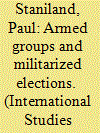

|
|
|
|
|
| Summary/Abstract |
Nonstate armed groups are often involved in electoral violence, but we know little about the origins or fates of these groups. This article develops an interactive theory of relations between governments and electoral armed groups. Governments assign different political roles to armed groups that reflect their ideological position and electoral value. State strategies flow from these political roles, but groups’ organizational capacity can allow them to resist government efforts to control, destroy, or incorporate them. The interaction of regime political interests and armed group autonomy leads to five distinct government-armed group trajectories, ranging from incorporation to violent conflict. I use comparative evidence from militarized elections in Karachi to illustrate the validity of the concepts and assess the power of the theory, while also exploring its limits and the need for future research. My argument and findings matter for our understanding of the linkages between democracy, civil conflict, and state power.
|
|
|
|
|
|
|
|
|
|
|
|
|
|
|
|
| 2 |
ID:
154842
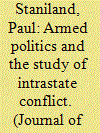

|
|
|
|
|
| Summary/Abstract |
Though the two are often conflated, violence is not identical to conflict. This article makes the case for studying state-armed group interactions across space, time, and levels of violence as part of an ‘armed politics’ approach to conflict. It conceptualizes and measures armed orders of alliance, limited cooperation, and military hostilities, and the termination of these orders in collapse or incorporation. The article applies this framework to four contexts in South Asia. It measures armed orders across five groups and six decades in Nagaland in India, and then offers a briefer overview of state-group armed orders in Karachi in Pakistan, Mizoram in India, and Wa areas of northern Burma/Myanmar. Examining armed politics improves our understanding of ceasefires and peace deals, rebel governance, and group emergence and collapse, among other important topics. This approach complements existing data on civil conflict while identifying a new empirical research agenda and policy implications.
|
|
|
|
|
|
|
|
|
|
|
|
|
|
|
|
| 3 |
ID:
112855
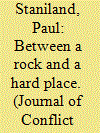

|
|
|
|
|
| Publication |
2012.
|
| Summary/Abstract |
Ethnic insurgents sometimes defect to join forces with the state during civil wars. Ethnic defection can have important effects on conflict outcomes, but its causes have been understudied. Using Sunni defection in Iraq as a theory-developing case, this article offers a theory of "fratricidal flipping" that identifies lethal competition between insurgent factions as an important cause of defection. It examines the power of the fratricidal-flipping mechanism against competing theories in the cases of Kashmir and Sri Lanka. These wars involve within-conflict variation in defection across groups and over time. A detailed study of the empirical record, including significant fieldwork, suggests that fratricide was the dominant trigger for defection, while government policy played a secondary role in facilitating pro-state paramilitarism. Deep ideological disagreements were surprisingly unimportant in driving defection. The argument is probed in other wars in Asia. The complex internal politics of insurgent movements deserve careful attention.
|
|
|
|
|
|
|
|
|
|
|
|
|
|
|
|
| 4 |
ID:
102969
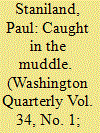

|
|
|
| 5 |
ID:
067780
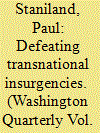

|
|
|
| 6 |
ID:
160741
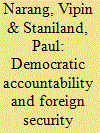

|
|
|
|
|
| Summary/Abstract |
Identifying the links between democracy and foreign security policy has proven elusive. This paper engages this research agenda by developing a novel theory of “accountability environments” and exploring it in the case of India. We hypothesize that the varying electoral salience of foreign security policy and the clarity of responsibility for policy outcomes combine to create different accountability environments in which politicians operate. Accountability environments determine the incentives that politicians face for devoting effort to external security issues. We illustrate the argument with evidence from India over time and across issue areas (India, Pakistan, and defense procurement/development). Scholars need to incorporate the complexities and diversity of representation and rule into the study of democratic politics and international relations.
|
|
|
|
|
|
|
|
|
|
|
|
|
|
|
|
| 7 |
ID:
082841
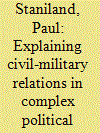

|
|
|
|
|
| Publication |
2008.
|
| Summary/Abstract |
This article argues that military intervention into politics can only be understood by studying both the nature of threats and of domestic political arrangements. I offer a theory of the military in politics built around the interaction between threat configuration, political institutionalization, and civilian government legitimacy. The argument is tested with paired-comparison case studies of Indian and Pakistani civil-military relations since independence. Despite their similarities at the time of partition, these two militaries took completely different political trajectories. The cases reveal how structures of domestic politics interact with military threat perceptions to explain civilians' ability to maintain varying levels of control over the military
|
|
|
|
|
|
|
|
|
|
|
|
|
|
|
|
| 8 |
ID:
161314
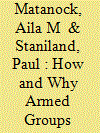

|
|
|
|
|
| Summary/Abstract |
Armed actors are often involved in electoral politics, from the fusing of ballots and bullets in armed political parties to insurgents covertly backing politicians. We develop new concepts and theory to better understand these complex relationships between violent actors and democratic practice. We first offer a novel conceptualization of armed groups’ electoral strategies that systematically maps out variation in the organizational directness and public openness of groups’ involvement in elections. We then use comparative case studies to develop theory about the conditions under which each of these electoral strategies is most likely, and what can trigger changes between them. The interaction of armed groups’ power and expectations of popular support with governments’ policies of toleration or repression determines the strategies of electoral participation that groups pursue. These concepts and arguments lay the foundation for a systematic research agenda on when and how “normal” and armed politics become intertwined.
|
|
|
|
|
|
|
|
|
|
|
|
|
|
|
|
| 9 |
ID:
114254
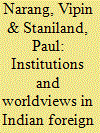

|
|
|
|
|
| Publication |
2012.
|
| Summary/Abstract |
This article explores the intersection of strategic worldviews and domestic institutions in the creation of India's foreign policy.We first show that Indian electoral politics have weak links with foreign policy. Insulated bureaucracies and small groups of elites dominate policy making because most elected officials are focused on winning votes and building coalitions around other issues. The ideas of the strategic elite are thus very important. We then identify major strands of thought among these elites: specifically, the desire for autonomy, distance from alliances, and skepticism of binding international commitments. Though there is heterogeneity, these basic elements can be found across much of the political spectrum. This continuity, despite changes over time in international and domestic politics, suggests that India will continue to pursue freedom of action rather than becoming a close ally of the United States.
|
|
|
|
|
|
|
|
|
|
|
|
|
|
|
|
| 10 |
ID:
158434
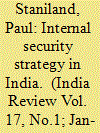

|
|
|
|
|
| Summary/Abstract |
The conventional wisdom among many analysts and policy-makers is that India’s central government has followed a fairly consistent internal security policy by deploying an “iron first in a velvet glove” that attacks irreconcilable armed groups, while holding open the door to mainstream politics for moderates. This article argues that this wisdom is incorrect. It instead offers a more political explanation of government strategy, showing that Delhi cares much more about some kinds of groups and conflicts than others, leading to a diverse pattern of strategies toward armed actors. Central government strategy is driven by varying political resolve for crackdowns and varying political space for either deal-making or neglect. Rather than a shared general approach, there is a far more selective and complex pattern of strategy. The paper examines both counterinsurgent conflicts and the murkier realm of private armies and armed political parties that blend “normal” politics with violence.
|
|
|
|
|
|
|
|
|
|
|
|
|
|
|
|
| 11 |
ID:
124054
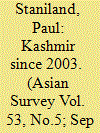

|
|
|
|
|
| Publication |
2013.
|
| Summary/Abstract |
Violence in the Kashmir Valley has dramatically declined since 2003, but this has not created a stable political order. India has not succeeded in overcoming the contradiction between its articulated ideals of "normalcy" and its actual policy, which undermines those ideals. This debilitating tension can be found elsewhere in Asia.
|
|
|
|
|
|
|
|
|
|
|
|
|
|
|
|
| 12 |
ID:
141180
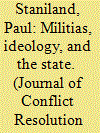

|
|
|
|
|
| Summary/Abstract |
Research on militias portrays them as subservient proxies of governments used to achieve tactical goals. The conventional wisdom, however, ignores the diversity of state–militia relations. This article outlines four distinct strategies that states can pursue toward militias, ranging from incorporation to suppression. It then argues that regime ideology shapes how governments perceive and deal with militias. A new theory of armed group political roles brings politics back into the study of militias. Comparative evidence from India and Pakistan shows that varying regime ideological projects contribute to different patterns of militia–state relations. These findings suggest that political ideas ought to be central to the study of political violence, militias should be studied in direct dialog with other armed groups, and a traditional focus on civil war should be replaced by the broader study of “armed politics.”
|
|
|
|
|
|
|
|
|
|
|
|
|
|
|
|
| 13 |
ID:
134434
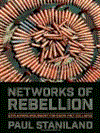

|
|
|
|
|
| Publication |
Ithaca, Cornell University Press, 2014.
|
| Description |
xii, 300p.Pbk
|
| Contents |
Includes bibliographical references and index
|
| Standard Number |
9780801479298
|
|
|
|
|
|
|
|
|
|
|
|
Copies: C:1/I:1,R:0,Q:0
Circulation
| Accession# | Call# | Current Location | Status | Policy | Location | IssuedTo | DueOn |
| 057936 | 303.64/STA 057936 | Main | Issued | General | | RA34 | 30-Mar-2024 |
|
|
|
|
| 14 |
ID:
167568
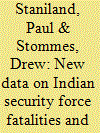

|
|
|
|
|
| Summary/Abstract |
National and state-level security forces across India operate against insurgents, criminals, and external threats. These operations are politically consequential, yet these forces tend to be quite opaque. This article provides new data on the fatalities that these forces have suffered in order to explore the location and nature of political violence in India. We create several new datasets of security force fatalities extracted from commemorative security force “martyrs” documents and online databases published by Indian state-level police organizations, the Ministry of Home Affairs (MHA), and the Ministry of Defence, as well as semi-official sources. The data vary wildly in quality and detail, and there are serious limits to their use. Nevertheless, they allow us to – with caveats – measure the location and incidence of violence, as well as the demographic underpinnings of the Indian Army, the two largest MHA paramilitaries, and several state police forces. Caveats aside, we anticipate that subsets of these data are sufficiently high in quality, facilitating future rigorous quantitative analysis on political violence in India. The entire dataset will be made publicly available.
|
|
|
|
|
|
|
|
|
|
|
|
|
|
|
|
| 15 |
ID:
113677
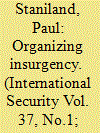

|
|
|
|
|
| Publication |
2012.
|
| Summary/Abstract |
A central question in civil war research is how state sponsorship, overseas funding, involvement in illicit economics, and access to lootable resources affect the behavior and organization of insurgent groups. Existing research has not arrived at any consensus, as resource wealth is portrayed as a cause of both undisciplined predation and military resilience. A social-institutional theory explains why similar resource wealth can be associated with such different outcomes. The theory argues that the social networks on which insurgent groups are built create different types of organizations with differing abilities to control resource flows. There is no single effect of resource wealth: instead, social and organizational context determines how these groups use available resources. A detailed comparative study of armed groups in the insurgency in Kashmir supports this argument. A number of indigenous Kashmiri insurgent organizations received substantial funding, training, and support from Pakistan from 1988 to 2003, but they varied in their discipline and internal control. Preexisting networks determined how armed organizations were built and how material resources were used. Evidence from other South Asian wars shows that this is a broader pattern. Scholars of civil conflict should therefore explore the social and organizational processes of war in their research.
|
|
|
|
|
|
|
|
|
|
|
|
|
|
|
|
| 16 |
ID:
173813
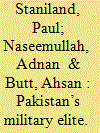

|
|
|
|
|
| Summary/Abstract |
The Pakistan Army is a politically important organization, yet its opacity has hindered academic research. We use open sources to construct unique new data on the backgrounds, careers, and post-retirement activities of post-1971 corps commanders and directors-general of Inter-Services Intelligence. We provide evidence of bureaucratic predictability and professionalism while officers are in service. After retirement, we show little involvement in electoral politics but extensive involvement in military-linked corporations, state employment, and other positions of influence. This combination provides Pakistan’s military with an unusual blend of professional discipline internally and political power externally – even when not directly ruling.
|
|
|
|
|
|
|
|
|
|
|
|
|
|
|
|
| 17 |
ID:
163243
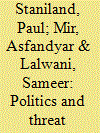

|
|
|
|
|
| Summary/Abstract |
Analysts and policymakers agree that the Pakistani military has engaged in selective repression of and collusion with armed groups. Yet beyond this general observation, fine-grained theory and evidence do not exist to systematically explain patterns of military strategy across groups and over time. This paper provides a theoretical framework for explaining regime perceptions of armed groups and the strategies state security managers pursue toward different types of groups. It then probes this framework using a combination of new medium-N data on military offensives, peace deals, and state–group alliances in Pakistan’s North West and four comparative case studies from North and South Waziristan. We argue that the Pakistani military—the key state institution in this context—has assigned armed groups to different political roles reflecting both their ideological affinity with the military and the operational benefits they can provide to the army. This mixture of instrumental and ideological motivations has created a complex blend of regime threat perceptions and state–group interactions across space and time. A clearer understanding of how the military views Pakistan’s armed political landscape can inform policy debates about the nature of Pakistani counterinsurgency, as well as broader theoretical debates about order and violence.
|
|
|
|
|
|
|
|
|
|
|
|
|
|
|
|
| 18 |
ID:
121583
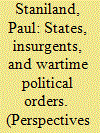

|
|
|
|
|
| Publication |
2012.
|
| Summary/Abstract |
Bargains, deals, and tacit understandings between states and insurgents are common in civil wars. This fascinating mix of conflict and cooperation shapes patterns of politics, governance, and violence. Building on recent findings about state formation, I offer a conceptual typology of political orders amidst civil war. Wartime political orders vary according to the distribution of territorial control and the level of cooperation between states and insurgents. Orders range from collusion and shared sovereignty to spheres of influence and tacit coexistence to clashing monopolies and guerrilla disorder. Examples from contemporary South Asian conflicts illustrate these concepts, which are scalable and portable across contexts. Scholars need to think more creatively about the political-military arrangements that emerge and evolve during war. A key policy implication is that there are many ways of forging stability without creating a counterinsurgent Leviathan.
|
|
|
|
|
|
|
|
|
|
|
|
|
|
|
|
| 19 |
ID:
156273
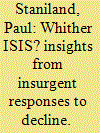

|
|
|
|
|
|
|
|